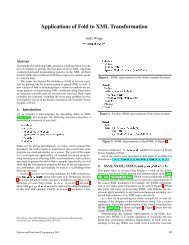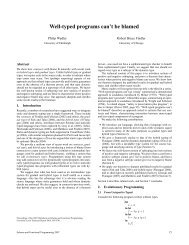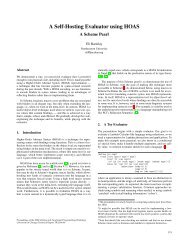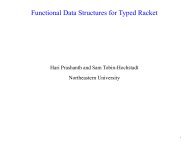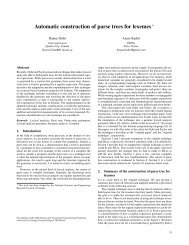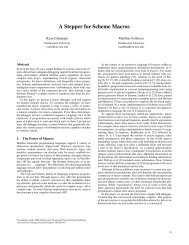2006 Scheme and Functional Programming Papers, University of
2006 Scheme and Functional Programming Papers, University of
2006 Scheme and Functional Programming Papers, University of
You also want an ePaper? Increase the reach of your titles
YUMPU automatically turns print PDFs into web optimized ePapers that Google loves.
need not worry about these issues, since it reflects the mechanism<br />
that already exists in the implementation we use.<br />
Efficient: the representation lends itself to efficient substitution<br />
for two reasons. First, function calls are an essential part <strong>of</strong><br />
functional languages that must be very efficient; a feature that<br />
our substitution inherits. Second, if we incrementally substitute<br />
some syntax value with multiple binding levels, then the substitutions<br />
are not carried out immediately but pushed to substitution<br />
cache contexts (=environments), which are the implementation’s<br />
efficient representation <strong>of</strong> closures.<br />
Good integration: representing concrete syntax with <strong>Scheme</strong> S-<br />
expressions is superior to the flat string representations that is<br />
found in other languages because the structure <strong>of</strong> the syntax is<br />
reflected in syntax values (values are “pre-parsed” into trees). In<br />
a similar way, HOAS adds yet another dimension to the representation<br />
— scope is an inherent part <strong>of</strong> representations (lexical<br />
scopes are already identified <strong>and</strong> turned to closures). We therefore<br />
enjoy all functionality that is related to scope in our implementation.<br />
For example, the unbound identifiers are caught by<br />
the implementation, analysis tools such as Dr<strong>Scheme</strong>’s “Check<br />
Syntax” [6] work for bindings in the representation, macros can<br />
be used, etc.<br />
These advantages, however, do not come without a price. More<br />
on this below.<br />
5. Improving the Code<br />
So far, the evaluator is simple, but the code is somewhat messy:<br />
lambda abstractions <strong>and</strong> primitive procedures are conflated, lists<br />
are used both as values <strong>and</strong> as syntax representations. Furthermore,<br />
the evaluator is not as complete as it needs to be to host itself. We<br />
begin by improving the code, <strong>and</strong> in the following section we will<br />
extend it so it can run itself.<br />
We begin by introducing a new type for our syntax objects, <strong>and</strong><br />
use this type to create tagged values for lambda abstractions <strong>and</strong><br />
applications:<br />
;; A type for syntax representation values<br />
;; Term = atom ; literals<br />
;; | (term ’if Term Term Term) ; conditionals<br />
;; | (term ’lam (Term ... -> Term)) ; abstractions<br />
;; | (term ’app Term ...) ; applications<br />
(define-struct term (tag exprs) #f)<br />
(define (term tag . args) (make-term tag args))<br />
;; Translates simple terms into a HOAS representation<br />
(define-syntax Q<br />
(syntax-rules (lambda if)<br />
[(Q (lambda args b)) (term ’lam (lambda args (Q b)))]<br />
[(Q (if x y z)) (term ’if (Q x) (Q y) (Q z))]<br />
[(Q (f x ...)) (term ’app (Q f) (Q x) ...)]<br />
[(Q x)<br />
x]))<br />
ev is then adapted to process values <strong>of</strong> this type.<br />
;; ev : Term -> Val<br />
;; evaluate an input term into a <strong>Scheme</strong> value<br />
(define (ev expr)<br />
(if (term? expr)<br />
(let ([subs (term-exprs expr)])<br />
(case (term-tag expr)<br />
[(lam) expr]<br />
[(if) (ev ((if (ev (car subs)) cadr caddr) subs))]<br />
[(app) (let ([f (ev (car subs))]<br />
[args (map ev (cdr subs))])<br />
(cond [(<strong>and</strong> (term? f) (eq? ’lam (term-tag f)))<br />
(ev (apply (car (term-exprs f)) args))]<br />
[(procedure? f)<br />
(apply f args)]<br />
[else (error ’ev "bad procedure")]))]<br />
[else (error ’ev "bad tag")]))<br />
expr))<br />
We can now test this evaluation procedure:<br />
> (ev (Q (lambda (x) (+ x 1))))<br />
#3(struct:term lam (#))<br />
> (ev (Q ((lambda (x) (+ x 1)) 2)))<br />
3<br />
> (define plus1 (Q (lambda (x) (+ x 1))))<br />
> (ev (Q (plus1 2)))<br />
3<br />
As the previous version, this evaluator does not maintain its own<br />
environment, instead, it uses the <strong>Scheme</strong> environment (in cooperation<br />
with the quotation macro that leaves bindings untouched). This<br />
is used as a definition mechanism that is demonstrated in the last<br />
example — but we have to be careful to use such values only in<br />
a syntax-representation context. Because the representation is using<br />
<strong>Scheme</strong> closures, we can use recursive <strong>Scheme</strong> definitions to<br />
achieve recursion in our interpreted language:<br />
> (define fact<br />
(Q (lambda (n)<br />
(if (zero? n) 1 (* n (fact (- n 1)))))))<br />
> (ev (Q (fact 30)))<br />
265252859812191058636308480000000<br />
Again, making this evaluator lazy is easy: we only need to avoid<br />
evaluating the arguments on beta reductions. In fact, we can go<br />
further <strong>and</strong> ‘compile’ lambda expressions into <strong>Scheme</strong> closures<br />
that will do the reduction <strong>and</strong> use ev* to continue evaluating the<br />
result. To deal with strict primitives properly, we evaluate them to<br />
a wrapper function that evaluates its inputs 5 :<br />
;; ev* : Term -> Val<br />
;; evaluate an input term into a <strong>Scheme</strong> value,<br />
;; this version is lazy, <strong>and</strong> ‘compiles’ closures to <strong>Scheme</strong> procedures<br />
(define (ev* expr)<br />
(cond<br />
[(term? expr)<br />
(let ([subs (term-exprs expr)])<br />
(case (term-tag expr)<br />
[(lam) (lambda args (ev* (apply (car subs) args)))]<br />
[(if) (ev* ((if (ev* (car subs)) cadr caddr) subs))]<br />
[(app) (apply (ev* (car subs)) (cdr subs))]<br />
[else (error ’ev "bad tag")]))]<br />
[(primitive? expr)<br />
(lambda args (apply expr (map ev* args)))]<br />
[else expr]))<br />
On first look, this change seems a bit dangerous — not only is a<br />
lambda expression represented as a <strong>Scheme</strong> closure, evaluating<br />
it returns a <strong>Scheme</strong> closure. In fact, this approach works as the<br />
types demonstrate: the function that is part <strong>of</strong> the representation is<br />
‘Term→Term’, whereas the ‘compiled’ closure is a ‘Term→Val’<br />
function. Note also that <strong>Scheme</strong> primitives act as primitives <strong>of</strong> the<br />
interpreted language (‘Val→Val’), <strong>and</strong> the evaluator wraps them<br />
as a ‘Term→Val’ function that allows uniform treatment <strong>of</strong> both<br />
cases in applications.<br />
Here are a few examples to compare with the previous evaluator:<br />
5 Ideally, any procedure that is not the result <strong>of</strong> evaluating a lambda expression<br />
should be wrapped. In Mz<strong>Scheme</strong> it is possible to tag some closures<br />
using applicable structs, but in this paper the code is kept short.<br />
<strong>Scheme</strong> <strong>and</strong> <strong>Functional</strong> <strong>Programming</strong>, <strong>2006</strong> 121




